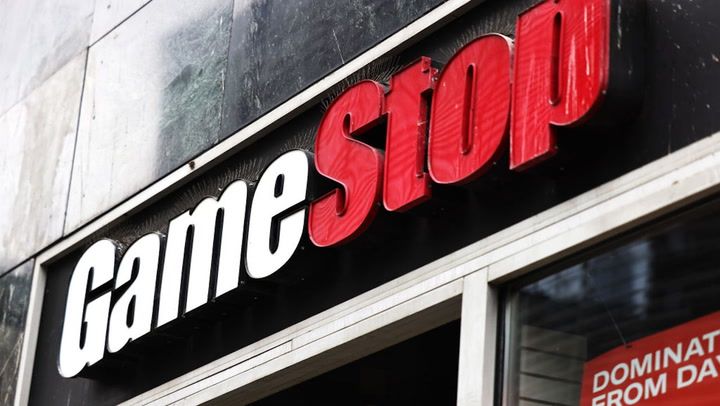The financial world is witnessing a dynamic shift as major corporations and governments take decisive steps regarding crypto assets. From GameStop’s potential Bitcoin treasury strategy to Nasdaq’s move toward a Polkadot ETF, institutional interest in crypto continues to grow. Meanwhile, macroeconomic concerns in the U.S. are affecting consumer confidence and stock markets, influencing investment behaviors. On the regulatory front, Dubai has approved Circle’s stablecoins, reinforcing its vision of becoming a leading digital asset hub. These developments highlight the interplay between crypto adoption, economic trends, and regulatory advancements, shaping the future of the digital economy.
GameStop Urged to Convert Cash Reserves into Bitcoin
GameStop, a well-known video game retailer, is being urged by Strive’s CEO, Matt Cole, to convert its $5 billion cash reserves into Bitcoin. Cole believes that adopting Bitcoin as a treasury asset could enhance GameStop’s long-term financial stability and create substantial value for shareholders. This recommendation comes amid an ongoing trend where companies, including MicroStrategy and Tesla, have incorporated Bitcoin into their balance sheets. The move would align GameStop with the growing digital asset economy and potentially position it as an innovative leader in corporate crypto adoption.
Despite the potential benefits, analysts caution against such a bold move. Bitcoin’s volatility presents a significant financial risk, and GameStop’s core business model does not directly align with cryptocurrency investments. Wedbush Securities analyst Michael Pachter pointed out that GameStop already trades at a premium relative to its net asset value, much like MicroStrategy, which has a strong Bitcoin correlation. If GameStop were to follow the same strategy, its stock price could become highly correlated with Bitcoin, making it susceptible to the unpredictable nature of the crypto market. Investors might see this as a speculative move rather than a strategic business decision.
GameStop’s interest in cryptocurrency is not new. The company has previously explored blockchain and NFT-related initiatives, signaling its openness to digital asset integration. However, a full-scale transition of cash reserves into Bitcoin could attract regulatory scrutiny and investor skepticism. If GameStop follows through with this idea, it may influence other companies to consider similar strategies, especially in sectors looking to hedge against inflation. For now, the market remains divided on whether such a move would be a game-changer or a financial misstep.
Market Impact:
If GameStop announces a Bitcoin investment, its stock price could experience short-term volatility. Bitcoin’s price may also react positively to the news, as corporate adoption signals growing institutional interest. However, regulatory concerns and investor sentiment will play a crucial role in determining the long-term effects.
Nasdaq Submits Filing to List Grayscale’s Polkadot ETF
Nasdaq has officially submitted a Form 19b-4 to the U.S. Securities and Exchange Commission (SEC) to list and trade shares of Grayscale’s Polkadot Trust (DOT) as an exchange-traded fund (ETF). If approved, this would mark one of the first ETFs to provide direct exposure to Polkadot, a blockchain network focused on interoperability and scalability. This filing is part of Grayscale’s broader strategy to expand crypto investment products, following its success with Bitcoin and Ethereum ETFs.
The potential listing of a Polkadot ETF signals growing institutional interest in blockchain ecosystems beyond Bitcoin and Ethereum. Polkadot, with its parachain technology, aims to improve blockchain interoperability, allowing different networks to communicate and share data efficiently. An ETF offering direct exposure to DOT would allow traditional investors to gain regulated access to the asset without dealing with cryptocurrency exchanges or private wallets. This development could lead to increased liquidity and broader adoption of Polkadot in mainstream financial markets.
Despite the optimism, regulatory approval remains a key hurdle. The SEC has historically been cautious with crypto ETFs, especially those tied to altcoins. The decision will depend on market transparency, security, and whether the Polkadot ecosystem meets compliance standards. If approved, this ETF could boost Polkadot’s adoption and price, similar to the impact seen with Bitcoin ETFs. On the other hand, a rejection might delay institutional participation in Polkadot’s ecosystem.
Market Impact:
If the ETF gets approved, DOT’s price could surge due to increased investor interest. The overall crypto market may benefit from greater institutional inflows. However, a rejection could dampen market sentiment, leading to a short-term price dip for Polkadot.
U.S. Consumer Confidence Declines Sharply in February
The U.S. consumer confidence index fell significantly in February 2025, dropping from 105.3 in January to 98.3. This marks the steepest monthly decline in over four years. The drop is attributed to persistent inflation concerns, rising interest rates, and economic uncertainty tied to trade policies under President Trump’s administration. Consumer sentiment is a crucial indicator of economic health, as it directly influences spending behavior. With consumer confidence declining, there are fears that reduced spending could slow economic growth.
A separate survey from the University of Michigan further reinforced these concerns, showing that consumer sentiment fell from 71.7 to 64.7 in the same period. The survey highlights that more than half of respondents expect unemployment to rise, while 40% report that inflation is negatively impacting their standard of living. These findings indicate that households are becoming more cautious, potentially cutting back on non-essential purchases, which could hurt retail, automotive, and housing sectors.
The decline in consumer confidence has already impacted financial markets. The S&P 500 and Nasdaq fell in response to the report, reflecting concerns over a possible economic slowdown. The Federal Reserve may need to reassess its monetary policy approach, balancing inflation control with economic growth. If consumer sentiment continues to weaken, policymakers might be pressured to adjust interest rates or introduce stimulus measures to prevent a prolonged downturn.
Market Impact:
A sustained drop in consumer confidence could lead to weaker corporate earnings, stock market corrections, and increased economic uncertainty. The crypto market may also experience volatility as investors seek safe-haven assets like Bitcoin during economic downturns.
Major U.S. Stock Indexes Experience Decline
The U.S. stock market has faced significant declines recently, with major indices posting losses amid economic uncertainty. The S&P 500 fell 1.7%, marking its worst trading day in two months. The Dow Jones Industrial Average dropped 748.63 points, closing at 43,428.02, while the Nasdaq composite saw a sharper decline of 2.2%. These downturns are primarily attributed to growing concerns over inflation, weak consumer sentiment, and uncertainties surrounding new tariff policies proposed by President Trump.
Market analysts suggest that the sell-off is driven by investor fears that trade tensions and protectionist policies could slow economic growth. Proposed tariffs on Chinese, Canadian, and Mexican goods have added to market instability, leading to reduced investor confidence. Additionally, weaker-than-expected housing sales and consumer sentiment data further weighed on stock valuations.
In response to the market downturn, investors have shifted their focus toward defensive sectors such as utilities and consumer staples. Some are also considering alternative investments, including Bitcoin and gold, as hedges against economic instability. If market conditions do not improve, the Federal Reserve may need to reconsider its stance on interest rate adjustments to support economic recovery.
Market Impact:
A continued stock market decline could push investors toward alternative assets like Bitcoin, strengthening its role as a hedge against traditional market instability. However, if economic conditions worsen, risk assets—including cryptocurrencies—may also face selling pressure.
Dubai Approves Circle’s Stablecoins USDC and EURC for Use in DIFC
The Dubai Financial Services Authority (DFSA) has officially approved Circle’s stablecoins, USD Coin (USDC) and Euro Coin (EURC), for use in the Dubai International Financial Centre (DIFC). This regulatory milestone allows financial institutions and fintech companies in DIFC to integrate USDC and EURC into payment solutions, treasury management, and cross-border transactions.
This approval highlights Dubai’s commitment to becoming a global hub for digital assets. The recognition of Circle’s stablecoins adds legitimacy to the $157 billion stablecoin market, reinforcing their role as trusted financial instruments. Stablecoins are crucial for bridging traditional finance with decentralized systems, offering a reliable medium of exchange without the volatility of cryptocurrencies like Bitcoin.
The DFSA’s move aligns with Dubai’s broader vision of creating a regulated crypto ecosystem. It also strengthens the region’s attractiveness for fintech companies looking for a friendly regulatory environment. With stablecoins playing a pivotal role in decentralized finance (DeFi) and remittances, this decision could drive increased adoption of digital assets in the Middle East.
Market Impact:
USDC and EURC may see increased adoption in the region, boosting demand. Dubai’s move could encourage other jurisdictions to introduce similar regulations, accelerating global stablecoin adoption.
Key Takeaways:
-
GameStop’s Bitcoin Consideration: Strive’s CEO, Matt Cole, is urging GameStop to invest its $5 billion cash reserves into Bitcoin, following the model of MicroStrategy. While this could enhance shareholder value, analysts warn of Bitcoin’s volatility and potential regulatory challenges.
-
Grayscale’s Polkadot ETF Proposal: Nasdaq has filed a request with the SEC to list a Polkadot ETF. If approved, it would be a major step toward institutional adoption of Polkadot, but regulatory hurdles remain.
-
Declining U.S. Consumer Confidence: The U.S. Consumer Confidence Index dropped sharply, raising fears of reduced spending and potential economic slowdown. This decline is impacting both traditional stock markets and risk assets, including cryptocurrencies.
-
Stock Market Decline Amid Economic Uncertainty: The S&P 500, Dow Jones, and Nasdaq suffered losses due to weak economic indicators and trade policy uncertainties under President Trump. Investors are shifting toward safe-haven assets.
-
Dubai Approves Circle’s Stablecoins: Dubai has given regulatory approval for USDC and EURC to be used in its financial sector, reinforcing its position as a crypto-friendly jurisdiction and boosting stablecoin adoption.







